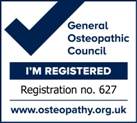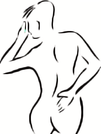Latest Blogs
Osteopath Rohan writes about the health benefits of gardening
by rohan iswariah on 03/04/16
There is plenty of research to show that gardening is good for your health
However gardening can cause aches and pains in the back, shoulders, elbows and knees mainly.
In this blog I will try to advise on how gardening is good for your general health and also how to avoid injury when participating?
Ten Health benefits.
Gardening can reduce the risk of stroke along with other exercise
Gardening burns calories. One hour of light work can burn 300+ calories,
3. Engaging in at least four hours of any exercise each week is associated with weight loss, reported the authors of a review published in “Medicine and Science in Sports and Exercise” in February 2009.
4. Gardening includes weight-bearing and muscle-strengthening exercise which are important for building and maintaining bone density
5. Gardening can reduce psychological stresses and might be more effective than some other forms of exercise a report from the Netherlands suggested.
6. This in turn can help prevent the leaching of calcium from bone into the blood to balance the acidic stress hormones like cortisol.
7. Vitamin D is essential for healthy bones by enhancing intestinal absorption of calcium; we get most of ours from sunlight exposure, and gardening is largely an outside pursuit
8. The best times to make vitamin D from
sunlight is from March to October, especially from 11am
to 3pm. Remember to avoid overexposure to sunlight though!
9. The connection to land has profound mood boosting benefits.
10. As too much stress weakens the immune system, it follows that any activity that helps us to relax will improve the immune system.
Many benefits are afforded by hobbies involving gardening but we need to do this safely and try to avoid injury.
Twelve tips to reduce injury risks.
1. Don`t do a lot of heavy lifting, digging or weeding in one go to avoid over-fatigue
2. Avoid bending forwards for long periods and take regular breaks
3. Access ground level by kneeling but avoid to much pressure on the knee caps by using a kneeler
4. Wet soil may be easier to dig but is heavier to carry
5. Use smaller spades with longer handles (Better leverage)
6. Weeding by using a hoe can help and remember large roots can be awkward so don`t twist the body too much when pulling
7. Divide up large loads for carrying, try to use a wheelbarrow when possible
8. Work at comfortable heights where possible
9. Avoid rotating too much when mowing lawns with hover mowers and be careful when pulling the cord on petrol mowers
10. A hot bath can help relax muscles afterwards, but remember if you have injured yourself heat can make inflammation worse so seek advice
11. Also seek advice if an ache or pain persists and doesn`t seem to be going away
12. Stay hydrated !
Rohan Iswariah D.O. (Registered Osteopath)
www.localosteopath.com (Phone 01491-838866 for free advice)
A GP Investigates Osteopathy
by rohan iswariah on 01/09/16
Headaches
by rohan iswariah on 12/04/15
Rohan Iswariah D.O., writes in November 2015: www.localosteopath.com
Headaches? Look at the alternatives before you pop another pill
People who regularly take medicines, such as aspirin, paracetamol and triptans could be causing themselves more pain than relief.?
Original Extract: Tuesday, 25 September 2012
It has been revealed that more than one million people in Britain may be suffering from constant, crippling headaches because they are taking too many painkillers, experts say. The pills people take to relieve headaches and migraines may be making things much worse, according to the National Institute for Health and Clinical Excellence (Nice) in guidance to the health service for England and Wales.
As many as one in 50 people suffer continual headaches because of "medication overuse", Nice reports. The problem begins with taking the odd painkiller for tension headaches or migraines, which usually works. But some people take the pills more and more often, until they are on tablets for more than half the days in a month. Nice says that if this goes on for more than three months the medication ends up causing the problem it is intended to cure.
So what alternatives are there to continually popping pills? British Osteopathic Association Member James Clapham comments, “tension-type and neck related headaches are the most common form of headache. If you suffer from tension-type headache, then regular gentle exercise will almost certainly help - such as yoga, pilates, swimming, walking. Some people find it hard to relax and probably don't realise how tense they are. If someone suffers from headaches it may also be neck related due to stiffness or restrictions of the neck. Osteopaths look to find the cause of tensions or stiffness and seek to relieve it by helping the body achieve more mobility and flexibility.
“Other lifestyle factors such as poor posture at a desk or tiredness can lead to tension-type or neck related headaches. Osteopaths look to relieve this tension and give advice on posture and exercises to do to help prevent the tension or stiffness from building up. For example we would recommend taking regular breaks from sitting at a computer desk for long periods of time or prolonged driving. Any persistent or sudden severe headache should always be checked by a GP first.”
For further information about the BOA or to find a BOA member near you please visit www.osteopathy.org
About the British Osteopathic Association
The British Osteopathic Association (BOA) is the professional association for osteopaths in the UK, acting as an independent representative body whilst promoting osteopathy to the general public and government. The BOA is committed to supporting, protecting and caring for its members and promoting opportunities for individual and professional development in osteopathic practice. There are nearly 4,000 osteopaths on the UK register who carried out over seven million treatments last year, and many of these are members of the British Osteopathic Association
The B.O.A is now called the Institute of Osteopathy
Cherries
by rohan iswariah on 12/03/15
Did you know that researchers in Boston University Medical Center found that eating at least 10 cherries a day protected people with existing gout from recurrent attacks ?
This was published in a supplement to the journal Arthritis & Rheumatism in 2012.
Study Co-author Hyon K. Choi, MD says that “Cherry intake was associated with a 50 percent lower risk of gout flares over a 48-hour period,” and also commented “We extrapolate that cherries will continue to work long-term.”
It is believed that anthocyanins – plant pigments may well have powerful antioxidant and anti-inflammatory properties and these are found in both red and purple fruits. These include raspberries and blueberries, but cherries, especially sharp tasting cherries, contain the higher levels.
British researchers in a 2014 study in the Journal of Functional Foods found that drinking Montmorency tart juice reduced blood levels of gout-causing uric acid. Another study in the same journal found that eating whole cherries led to a similar increase in anthocyanins.
Researchers at Robert Wood Johnson Medical School in New Brunswick, N.J., saw a 50 percent reduction in flares when gout patients took one tablespoon of tart cherry extract – the equivalent of 45 to 60 cherries – twice a day for four months, although this was a small study.
There are other studies suggest that cherries may also help reduce symptoms of osteoarthritis (OA). In a 2013 article in Osteoarthritis and Cartilage, researchers at the Philadelphia VA Medical Center reported a significant improvement in pain, stiffness and physical function amongst patients who consumed two 8-ounce bottles of tart cherry juice daily for 6 weeks. A decrease in sensitivity to some inflammatory markers was also reported.
Other positive studies exist but more exploration is necessary to establish a viable cherry regimen. Additional information is available on the Arthritis Foundation website as written by Linda Rath. For other articles and information please see www.localosteopath.com/Osteopathy2
Rohan Iswariah D.O. (osteopath) 01491 838866 & 07788421890


